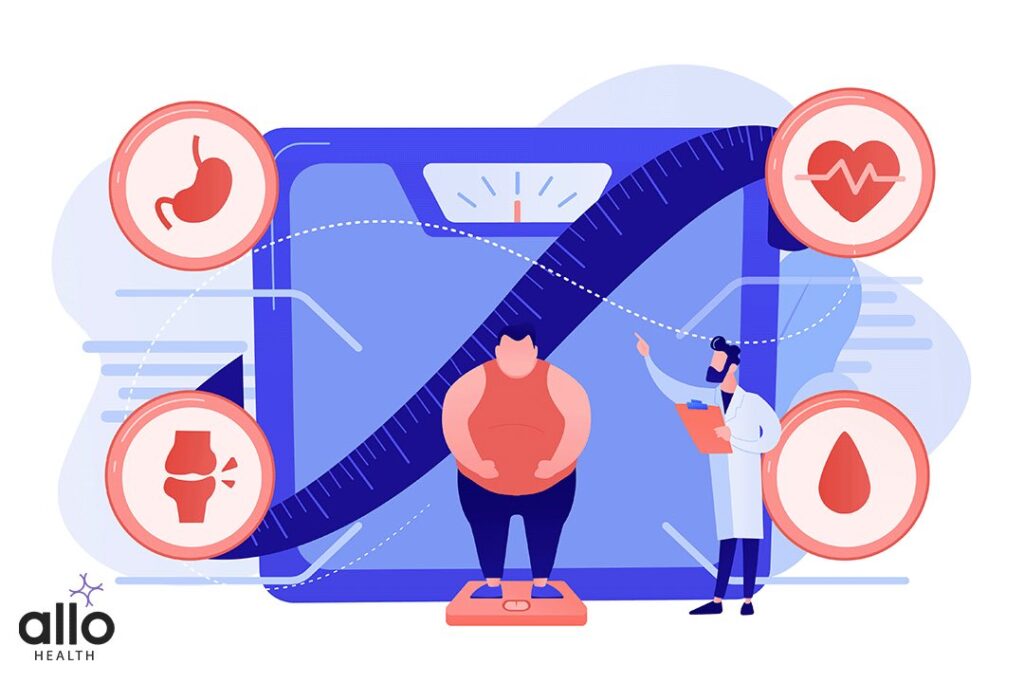Obesity and Sexual Dysfunction: What’s The Deal?

Allo Health is dedicated to personalized well-being, offering support and trusted information tailored to individual health goals. The platform emphasizes human-generated content, led by a distinguished medical team of experts, including physicians and sexual health specialists. Their commitment to credibility involves rigorous fact-checking, authoritative research, and continuous updates to ensure accurate, up-to-date information. Allo Health's unique approach goes beyond conventional platforms, providing expert-led insights and a continuous commitment to excellence, with user feedback playing a crucial role in shaping the platform's authoritative voice.

Ms Ashima Sahore has a masters in Clinical Psychology and has been working avidly in the space of therapy and research for the past 2 years. Her expertise lies in areas of stress, depression, anxiety, improving self-esteem, confidence, body appreciation among many others. She imbibes a wholesome approach to therapy and provides a non-judgemental, LGBTQAI+, and safe space.
Why This Was Upated?
Our experts continually monitor the health and wellness space, and we update our articles when new information became available.
Updated on 22 April, 2024
- Article was updated as part of our commitment to diversity, equity, and inclusion.

"The following blog article provides general information and insights on various topics. However, it is important to note that the information presented is not intended as professional advice in any specific field or area. The content of this blog is for general educational and informational purposes only.
Book consultation
The content should not be interpreted as endorsement, recommendation, or guarantee of any product, service, or information mentioned. Readers are solely responsible for the decisions and actions they take based on the information provided in this blog. It is essential to exercise individual judgment, critical thinking, and personal responsibility when applying or implementing any information or suggestions discussed in the blog."
Admit it. You’re not surprised. Anyone who’s read the news in the past several years has seen the growing research on how obesity can lead to a host of health concerns, including hypertension, chronic inflammation, and diabetes. With all these (and many more) negative effects on your health, it’s not shocking that obesity can also contribute to sexual dysfunction.
By definition, Obesity is referred to a condition in which excess body fat puts an individual at risk of many medical conditions such as heart disease or other cardiovascular risk factors. Obesity or being overweight has been a topic of conversation among medical experts for a while now. The reason is that excess fat has a drastic and significant impact on the individual’s organs and therefore, physical and mental health.
Obesity Diagnosis Criteria
Obesity is a serious health condition that affects millions of people worldwide. It is defined as having a body mass index (BMI) of 30 or higher. However, there are several other criteria that healthcare professionals use to diagnose and classify severe obesity.
- One key criterion is waist circumference. Individuals with a waist circumference of 40 inches or more for men and 35 inches or more for women are considered to have abdominal obesity, which is a strong indicator of the presence of excess body fat and an increased risk for health complications.
- Another criterion is the presence of comorbidities or other health conditions that are related to obesity. These can include type 2 diabetic patients, high blood pressure, sleep apnea, and heart disease. The presence of these conditions can indicate that a person’s obesity is severe and may require additional treatment and management.
In addition to these criteria, healthcare professionals also consider a person’s overall health and well-being when making a diagnosis of obesity. This can include assessing their physical activity levels, dietary habits, and overall quality of life.
| An individual is diagnosed with Obesity if their Body Mass Index (BMI) is 30 or greater. They are overweight if their BMI is 25 or greater. |
Obesity is a growing concern in many countries, and it can have a significant impact on a person’s overall health and well-being. One area where obesity can also have a negative impact is sexual function. In this article, we will explore the link between obesity and sexual dysfunction, and what can be done to address this concern.
When a person is overweight or obese, they are at an increased risk for several health concerns, including heart disease, diabetes, and high blood pressure. These conditions can all contribute to sexual dysfunction in both men and women.
In men, obesity can lead to erectile dysfunction (ED), which is the inability to achieve or maintain an erection. This is because obesity can cause damage to the blood vessels and nerves that are necessary for an erection to occur. Additionally, obesity can also lead to low testosterone levels, which can further contribute to ED.
In women, obesity can lead to sexual dysfunction by causing a decrease in sex drive and making it more difficult to become sexually aroused. This can be due to several factors, including hormonal imbalances, emotional concerns, and physical concerns such as pain during intercourse.
The good news is that there are ways to address the link between obesity and sexual dysfunction. One of the most effective methods is to lose weight through a combination of diet and exercise. Reducing body fat, can help improve blood flow, increase energy levels, and improve overall health.
Medications and therapy can also be used to help treat sexual dysfunction caused by obesity. For example, some medications can be taken to help with ED, such as phosphodiesterase type 5 inhibitors (PDE5 inhibitors), which can improve blood flow to the penis.
Now, how does excessive fat affect sexual function? Let’s do a brief introduction. Sexual Dysfunction is an umbrella term used to describe disorders that affect an individual through any point of the sexual response cycle – these include, desire, arousal, orgasm, and pain disorders. The most common types of sexual dysfunctions include Low Sexual Desire or Libido, Erectile Dysfunction, Premature Ejaculation, Performance Anxiety, and Lack of Lubrication.
Obesity-Related Sexual Dysfunctions
Let’s get to the main question, how can obesity lead to sexual dysfunction?
Sexual Dysfunction In Women
Obesity is a growing concern in the modern world, affecting not only physical health but also psychological and sexual well-being. In women, obesity can lead to several sexual dysfunctions, including decreased desire, difficulty with arousal, and pain during intercourse.
- One of the main reasons for these sexual dysfunctions in women is the hormonal changes that occur with obesity. Excess weight can lead to an increase in estrogen levels, which can disrupt the balance of hormones in the body and lead to decreased libido and difficulty with arousal. Additionally, obesity can also lead to insulin resistance and type 2 diabetes, which can further contribute to sexual dysfunction.
- Another concern is the physical effects of obesity on the body. Excess weight can lead to a variety of physical difficulties, including decreased mobility, fatigue, and pain in the joints. These physical difficulties can make it difficult for women to engage in sexual activity, and can also lead to pain during intercourse.
- Obesity can also have a significant impact on a woman’s self-esteem and body image. Many women who are struggling with their weight may feel self-conscious or uncomfortable with their bodies, which can lead to decreased sexual desire and difficulty with arousal.
Fortunately, there are several ways to address obesity-related sexual dysfunctions in women. Weight loss through diet and exercise is an effective way to improve sexual function by reducing the physical and hormonal effects of obesity. Additionally, counseling or therapy can help women to work through concerns related to body image and self-esteem.
It is important to note that, in some cases, medications may be prescribed by a doctor to help with sexual dysfunction. However, it is always best to address the underlying concern by losing weight and maintaining a healthy lifestyle.
Sexual Dysfunction In Men
Obesity can have a significant impact on a man’s sexual health and can lead to a variety of sexual dysfunctions. These dysfunctions can include erectile dysfunction, low libido, and difficulty achieving orgasm.
- Erectile dysfunction (ED) is a common concern among obese men and can be caused by several factors. One of the main causes is an impairment of blood flow to the penis, which can be caused by the build-up of plaque in the blood vessels. This can make it difficult for men to achieve and maintain an erection.
- Low libido is another common concern among obese men. This can be caused by a variety of factors, including hormonal imbalances and a decrease in testosterone levels. In addition, psychological factors such as stress and depression can also contribute to low libido in obese men.
- Difficulty achieving orgasm is another sexual dysfunction that can occur in obese men. This can be caused by several factors, including nerve damage and a decrease in blood flow to the penis. In addition, psychological factors such as stress and anxiety can also contribute to difficulty achieving orgasm.
It’s important to note that obesity can also lead to other health concerns such as diabetes, heart disease, and high blood pressure, which can further complicate sexual dysfunctions.
Obese men can take several steps to improve their sexual health. Losing weight through a combination of diet and exercise is one of the most effective ways to improve sexual function. Eating a healthy diet, rich in fruits, vegetables, and lean proteins, can also improve sexual health. In addition, quitting smoking and reducing alcohol consumption can also improve sexual function.
If you’re an obese individual experiencing sexual dysfunction, it’s important to speak with your healthcare provider. They can help determine the cause of your dysfunction and recommend appropriate treatment options
Physical Effects
Because obesity can lead to physical medical conditions, it can lead to uncomfortable and/or painful sex. Some of the chronic diseases or conditions that can be caused by obesity include:
- Arthritis
- Chronic obstructive pulmonary disease (COPD)
- Diabetes
- Heart disease and/or heart disease-related Edema (fluid build-up leading to body swelling)., coronary artery disease, vascular disease, etc.
- Sleep Apnea and other respiratory concerns
- Hypertension or high blood pressure
- Hypercholesterolemia or high cholesterol
Mental & Emotional Effects
An obesity diagnosis is, at times, associated with emotional and mental health conditions. Stress and anxiety are caused by weight concerns themselves and in many cases, it’s not just about being overweight but rather feeling like a failure because they’re not able to lose weight despite repeated attempts at dieting or exercising regularly; this can lead them to depressive symptoms as well as other mental health concerns such as anxiety or low self-esteem which could further hinder their ability to perform sexually with their partners later on down the road (if at all). This coupled with many individual and subjective factors can also become a barrier to sexual intimacy in a relationship.
Cardiovascular Risks
Obesity is a major risk factor for cardiovascular disease, and it is a growing concern worldwide. The more body fat a person has, the greater their risk of developing conditions such as heart disease, stroke, and high blood pressure.
One of the primary ways in which obesity increases cardiovascular risk is by raising levels of LDL cholesterol, also known as “bad” cholesterol. This type of cholesterol can build up in the arteries, increasing the risk of heart attack and stroke. Obesity also increases inflammation in the body, which can further contribute to the development of cardiovascular disease.
Another major risk associated with obesity is type 2 diabetes. This form of diabetes is closely linked to obesity, and it can lead to several serious health concerns, including heart disease and stroke. In addition, obesity can also increase the risk of sleep apnea, which is a condition that causes disruptions in breathing during sleep and can lead to high blood pressure and other cardiovascular concerns.
To reduce the risk of cardiovascular disease associated with obesity, it is important to maintain a healthy weight through a combination of regular exercise and a balanced diet. This can be achieved through a variety of lifestyle changes, such as eating more fruits and vegetables, cutting back on processed foods, and engaging in regular physical activity.
In addition to lifestyle changes, some people may also benefit from weight loss medications or bariatric surgery to help them achieve and maintain a healthy weight. However, it’s important to note that these options should be used under the guidance of qualified health professionals.
What’s the solution?
Obesity is a major risk factor for sexual dysfunction. It can cause low testosterone levels, erectile dysfunction, low sexual desire, and infertility. It’s also been linked to Gynecomastia (breast enlargement) and Hypogonadism (low testosterone). Many studies have shown that obesity is associated with lower self-reported levels of sexual activity and satisfaction.
If you’re looking for a quick fix, though, we have some bad news: there’s no magic pill or anything like that. There’s treatment, but it isn’t particularly easy or fun.
Everybody has comfort foods, but working towards increasing your intake of—lots of fruits and veggies with lean meats and whole grains. You may also want to exercise more often than before—a good rule of thumb is 150 minutes per week of moderate-intensity cardio exercise (like brisk walking), plus two days per week of strength training.
If that sounds too hard on its own, consider working with a nutritionist who can help guide you through the process step by step without feeling overwhelmed by all those new rules about what ‘healthy’ eating means. A good place to start would be asking friends if they know anyone who could recommend someone; otherwise, search online for “nutritionist” along with your city name.
Well, it’s not just the physical effects that cause concerns like ED. The psychological and emotional concerns that come with obesity can also harm your sex life. It can be hard to feel confident in the bedroom if you’re not feeling confident in your body. But remember, there are many ways to treat obesity so that you can start feeling more comfortable in all aspects of life.
Obesity is a growing health concern that affects millions of people worldwide. Not only does it increase the risk of various diseases such as diabetes and heart disease, but it can also have a significant impact on sexual health.
Obesity can lead to several sexual health concerns, including erectile dysfunction (ED) in men and decreased sexual desire in both men and women. This is because obesity can lead to a decrease in testosterone levels, which is a key hormone involved in sexual function. Additionally, obesity can also cause physical and psychological factors that can negatively affect sexual function, such as low self-esteem and decreased confidence.
It is important to note that, losing weight can have a positive impact on sexual health. Research has shown that weight loss can improve sexual function in both men and women and can also increase testosterone levels. This can lead to improved sexual function and a higher sex drive.
To improve sexual health and overall well-being, it is essential to maintain a healthy weight through a combination of regular exercise and a healthy diet. Additionally, addressing any underlying psychological concerns that may be contributing to sexual dysfunction, such as anxiety or depressive symptoms, is also important.
What you can do?
If you are struggling with obesity, know that you are not alone and that there are steps you can take to overcome it. In this article, we will discuss some strategies for overcoming obesity and achieving a healthy weight.
- Eat a healthy diet: Eating a diet that is high in fruits, vegetables, whole grains, and lean protein can help you lose weight and improve your overall health. Avoid processed foods, sugary drinks, and fast food.
- Exercise regularly: Physical activity is essential for weight loss and overall health. Aim for at least 30 minutes of moderate-intensity exercise, such as brisk walking or cycling, every day.
- Get enough sleep: Lack of sleep can lead to weight gain and other health concerns. Aim for 7-9 hours of sleep per night.
- Manage stress: Stress can lead to overeating and weight gain. Practice stress-management techniques such as meditation, yoga, or deep breathing to help you healthily cope with stress.
- Seek professional help: If you are struggling to overcome obesity on your own, consider seeking help from a healthcare professional or a registered dietitian. They can provide you with personalized guidance and support to help you achieve your weight loss goals.
Your Guide To Healthy Calorie Consumption
Eating a healthy diet is essential for maintaining healthy body weight and overall well-being. One key aspect of a healthy diet is ensuring that you are consuming the right amount of calories. In this article, we will discuss the importance of healthy calorie intake and provide tips on how to make sure you are getting the right amount of calories for your body.
Calories are a unit of measurement for energy and are necessary for the body to function properly. They provide the body with the energy it needs to perform daily activities such as walking, talking, and even thinking. However, consuming too many or too few calories can lead to weight gain or weight loss, respectively.
The recommended daily calorie intake for an adult varies depending on factors such as age, gender, weight, and activity level. The average adult needs between 1,600 and 2,400 calories per day to maintain a healthy weight. However, it’s important to note that this number can vary depending on your individual needs and goals.
To make sure you are consuming the right amount of calories, it’s important to pay attention to your body’s signals. If you find yourself feeling constantly hungry, it may be a sign that you are not getting enough calories. On the other hand, if you find yourself feeling overly full or sluggish after eating, it may be a sign that you are consuming too many calories.
Another way to ensure you are getting the right amount of calories is to track your intake. There are many apps and websites available that can help you track your calorie intake, making it easy to see how much you are consuming each day.
When it comes to healthy calorie intake, it’s also important to focus on the quality of the calories you are consuming. Eating a diet that is high in nutrient-dense foods such as fruits, vegetables, whole grains, and lean proteins will not only provide you with the energy you need but also the essential vitamins and minerals your body needs to function properly.
With all this being said, it is important to know that Obesity is not a disease, but it is a serious condition that can lead to life-threatening health conditions and sexual dysfunction. The stigma associated with it is unnecessary and counterproductive. Treatment is possible, and the journey is worth it.







































